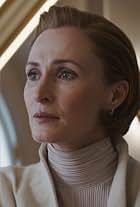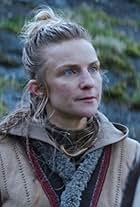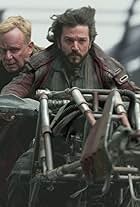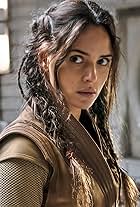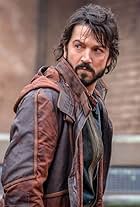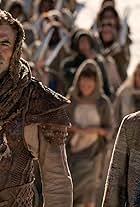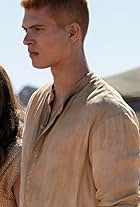
moviesfilmsreviewsinc
Joined Mar 2015
Welcome to the new profile
We're still working on updating some profile features. To see the badges, ratings breakdowns, and polls for this profile, please go to the previous version.
Ratings1.8K
moviesfilmsreviewsinc's rating
Reviews1.7K
moviesfilmsreviewsinc's rating
In the fifth episode of Andor, Luthen Rael (Stellan Skarsgård) and his assistant Kleya (Elizabeth Dulau) discuss the future of the Rebellion. Luthen is concerned that Cassian's job on the planet Aldhani is going to go south, while Kleya believes everything will work out. The show's promise seems to be torn between two perspectives: it's just getting started or it's not. As a Star Wars series intent on presenting naturalism as opposed to melodrama, Andor continues to deliver more of the same excellence in acting and solid dialogue as the first four episodes. Star Wars has never felt this grown-up and secure in telling a story in which people talk like real people and do normal things. The blue milk throughout Star Wars is something of an intellectual punchline, as the milk couldn't just look normal because...reasons. Andor plays the Star Wars canon like an accordion, sometimes revealing glimpses of a TIE fighter, sometimes long shots of blue milk, and other times, the accordion is closed, and no Star Wars easter eggs are required, because the story isn't about that kind of thing. If literary realism isn't your thing, and you watch Star Wars for the pew-pew blasters and the space adventure, "The Axe Forgets" isn't suddenly shifting the show into hyperdrive. The big Rebellion heist on Aldhani seems scheduled for next week, but even in this episode, it's a little difficult to know exactly how many times everyone in the camp has to go to sleep before they can wake up and do something again. Being a freedom fighter for the Rebellion would be tedious, difficult, and uncomfortable. Andor has made its point with episode 5, the adventures of Luke Skywalker and Han Solo are nothing like what life was like for the rest of the people in the Rebellion. However, because this episode is still mostly focused on setting-up various character threads, it remains to be seen if Andor's novelty can actually transform into something else. Right now, the show still feels fresh because it's such a contrast to the rest of Star Wars. But Andor can't just continue to be praised for what it's not, it has to succeed or fail on its own merits. It's either going to be all over tomorrow, or it's just getting started. Just because Andor is rebelling against the Star Wars mold doesn't mean the entire series is intrinsically brilliant. Yet, at this point, it hasn't actually delivered on its promise. When all the Rebels learn that Cassian is just in it for the money, there's a moment where they don't trust him. This is kind of meta. Is the show the same way? Is this a brilliant introspective sci-fi drama, or is Andor just meandering because it can? For now, the hope for Andor is that its various plot threads will evolve in surprising, but realistically inevitable ways. Vel (Faye Marsay) and Cinta (Varada Sethu) have some secret role in the heist at the Imperial Base, but who is Uncle Harlo? What's up with Mon Mothma's crummy family? Where is Cassian's sister? Andor probably won't answer these questions in the way that we think. But it will need to move the show out of the "beginning" and start pushing us somewhere toward the "middle" very soon. If the show continues at this pace, some of the early goodwill for Andor might slowly turn toward the dark side.
Andor, a Star Wars series, features a visual motif of people walking with purpose, particularly in its second episode. The show cuts from Cassian and his forest-kid pals on Kenari, who are on their way to an abandoned mining facility where a ship has crashed, to a man on Ferrix ascending to a bell tower for a day-ending ritual. Cassian's walk is then intercut with Ferrix workers hanging up their equipment and presumably heading home. This scene evokes striking shots from Rogue One, including one that is in the trailer but not the movie. The first five or six minutes of Andor are notable for their dialogue-free moments, which give a more tangible sense of place than we've seen in other recent Star Wars shows. The episode is brief, with about 30 minutes spent clarifying and elaborating on setup from the previous episode. For example, we meet Cassian's mother, Maarva, who waits for him with his sensitive droid B2EMO. They, along with Bix's current beau, Timm (James McArdle), have heard the bulletin to watch out for a shifty Kenarian, placing some urgency on Cassian's plan to sell his MacGuffin Empire gizmo and get the hell out of Dodge. Syril Karn gets pumped to apprehend Andor and assembles a hilariously dour 12-man force at the urging of his right-hand man, who enthuses that "corporate tactical forces" like theirs are the Empire's best defense against "fomenting pockets" of rebellion. However, the 12-man force fails to match this level of company spirit, even in the face of Syril's hilariously lacking inspirational speech. Meanwhile, Bix summons her buyer for Cassian, who books a hasty pickup service, refusing to tell the pilot anything about the cargo. The moments that make this episode feel most like a chunk of a longer pilot are the scenelets that introduce Luthen Rael (Stellan Skarsgård). Rael does some purposeful walking as he travels from ship to Ferrix shuttle in relative silence, with Skarsgård on the receiving end of a "hello there" movie-star face-reveal shot. He's presumably traveling to find Cassian, and the show cuts to Cass when another passenger muses to Rael that they can find "anything" at their destination. In summary, Andor is a visually appealing and transitional series that showcases the characters' purposeful walking and the aftermath of a mining disaster.
The season 3 finale of The Wheel of Time showcases some great moments, but it feels rushed and scattered at times. It ties up plots and foreshadows what's to come in season 4. "He Who Comes with the Dawn" further demonstrates that the show is willing to pull the rug out from under book readers with surprising changes to the source material, even as it embraces some of the weirder aspects of Robert Jordan's worldbuilding. The finale opens on a flashback of Elaida visiting the wish-granting Finn and coming back with a charm bracelet and a promise that she would become the Amyrlin Seat. It shows how tenuous Siuan Sanche's control of the White Tower has always been, and how long Elaida's resentment has been building. The show also shows how far the Aes Sedai have fallen as they go from a contentious but orderly election to a violent coup where Siuan's allies are deceived so she can be stilled and killed. Shohreh Aghdashloo shines in the role of Elaida, drawing on her ability to project superiority and look fabulous in garish outfits that made her such a standout in The Expanse. She makes a fantastic foil to Sophie Okonedo, who brought such a sense of hardship and loss to Siuan's toughness. After so much foreshadowing that Moiraine would die, it caught me entirely by surprise that Siuan is killed instead - the Amyrlin sticks around until the Last Battle in the books. That makes me even more convinced that Loial actually died closing the Waygate last week. More scenes between Moiraine and Liandrin as they team up to take on the other Chosen are not looking forward to more scenes between her and my other least favorite character, Liandrin. Rand is doing better than I might have thought given the end of "The Shadow in the Night," fulfilling his promise to harvest Alsera's squash and then teaming up with all his allies to lay a trap for Lanfear. The way the dream scene shifts from twisted flirtation to outright hostility provides a perfect transition for Rand's relationship with his Forsaken lover. Lanfear has many plots in motion that she uses for her counterattack. Melindhra had felt like an unnecessary addition to this season until this week, when the Malkieri provides another example of how the Dark One preys on desperation. Her decision to put Lan's life before her own soul is something that Lanfear couldn't predict because she has no loyalty to anyone but herself. That oversight gives Moiraine a key edge in their fight. Ciaran Donnelly has directed most of The Wheel of Time's biggest battle episodes and shines again here, skillfully interweaving Moiraine and Lan's fight with Lanfear with Rand's attempts to win over the Aiel and Siuan's final speech to the White Tower. As a result, we get to see multiple fronts in the fight to prepare the Dragon Reborn to face the Dark One, with Siuan's death balanced by the victories in the Aiel Wastes. "He Who Comes with the Dawn" blends moments that could be found in Dune, Game of Thrones, and Pan's Labyrinth, which is true to Jordan's work even if the quick transitions between them didn't always feel coherent.
